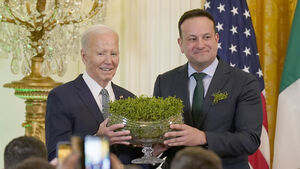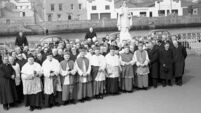History will be kinder to Varadkar than the Opposition were

Taoiseach Leo Varadkar and US President Joe Biden during the St Patrick's Day Shamrock Ceremony in the East Room of the White House, Washington DC, on March 17 last. Picture: Niall Carson/PA Wire
On a recent programme on Mid-West Radio, in the wake of Leo Varadkar’s resignation as Taoiseach, I made the comment that I thought the response in the Dáil to his final Leader’s Questions was less gracious than it might have been. I wasn’t surprised by a listener concluding that I must be a Fine Gael supporter!
Not true, I hasten to add! I’m what’s called ‘a floating voter’ in that I’ve no particular political allegiance. In different elections and at different times I’ve voted for all of the main political parties with the exception of Sinn Féin – as regular readers of this column will know and will know why. I’ve also voted regularly for Independents.
On the other hand, hard-nosed political loyalists who invariably identify with one particular party, find it difficult to accept that other factors (apart from a tribal or familial loyalty to one brand) can stand their ground in deciding how to vote.
Factors like a commitment to public service, an established reputation, a moral compass and other relevant abilities not least intelligence and the courage to call it as it. But, of course, for the seasoned political loyalist it sometimes seems (to political outsiders like myself) that all that matters is the label.
This explains to some extent at least why Varadkar, on his final appearance in the Dáil for Leader’s Questions, received a roasting from the opposition parties.
Such occasions are usually formulaic in that tributes, real and sycophantic, to an outgoing Taoiseach follow a tried and tested formula – a long-established pattern of what Kathy Sheridan in called "conventional courtesies’"
This time it was a charade by a vocal and strident opposition suggesting that changing Taoiseach in mid-term was anti-democratic, as if it was some kind of illicit stroke being pulled when clearly it is simply part of the established protocol of Dáil Éireann. The same wheeze was attempted by Sinn Féin after the last election when they found themselves the largest party in the Dáil. They pretended that their performance on its own merited governance despite the fact that everyone knew that in accordance with Dáil procedure a Taoiseach is elected only when a party or a coalition of parties achieves a majority of the overall seats.
Included in last week's charade was the pretence that the coalition was being ‘anti-democratic‘ by instigating a long established constitutional protocol. The silly posturing of opposition parties intent more on self-publicity than on legitimate point-scoring had the effect not of diminishing Varadkar or his achievements but of advertising their own limitations and their spurious aptitude for government.
What people know and what history in time will no doubt record is that Leo Varadkar was a substantial figure in the 20 or so years he spent in politics. He was different. He was cut from a different cloth. He called things as he saw them. He had no truck with political traditions or indeed with partisan loyalties. And he didn’t attend funerals of people he didn’t know.
After deciding on a political career, his political antennae helped him to find a party he was comfortable with – at one point he considered joining the Progressive Democrats – but eventually opted for Fine Gael as a more ambitious entity. He estimated wisely that an established political brand was the better prospect.
His journey through the ranks reflected both his ambition and his ability. Appointed to the Fine Gael front bench on his first day in the Dáil in 2007, a number of ministries followed once the party entered Government under Enda Kenny's leadership in 2011. In 2017, Varadkar was elected as leader and then Taoiseach, steering the country though the first wave of Covid-19 in the spring of 2020 before becoming Tánaiste and Taoiseach again.
In what has been a relatively short though varied career, Varadkar’s CV is hugely impressive. His ability and his commitment are unquestioned and nowhere more so than in his response to the Covid epidemic. In New York on St Patrick’s Day, 2020, as he reflected on the challenge the country faced, he said: "In years to come let them say of us when things were at their worst, we were at our best." Inevitably, at a time of such uncertainty, mistakes were made but Varadkar’s leadership was calm, directed and impressive, and was set in relief by due comparison with other leaders. Unlike the hapless Boris Johnson, invariably Varadkar was well prepared and could isolate quickly what needed to be done and how to do it.
His response to the Brexit crisis was similarly assured and he is generally accepted as the politician who held the EU support base together so that there was no land border on the island of Ireland. Stephen Collins, in , described it as "a master class in hard-nosed diplomacy".
On other issues like welcoming refugees from Ukraine and other places, the Gaza nightmare and climate change he brought a definitively moral perspective to his positive and productive leadership. He wasn’t afraid to help us examine our consciences when at the climate change conference he described the Republic in 2018 as a climate-change ‘laggard’ and later that we were now ‘a rich country’ ready to play and pay our part in the greatest challenge of all to our world. He also did more than a bit to end (with Micheál Martin) the great division in civil war politics by bringing Fianna Fáil and Fine Gael together in government.
It was a source of great pride for Ireland that his leadership, notably on the European and world stages in the last few years, emanated from such a credible and unashamed ethical viewpoint.
Credit where credit is due and political opponents do themselves no service in not having the grace to say it.




